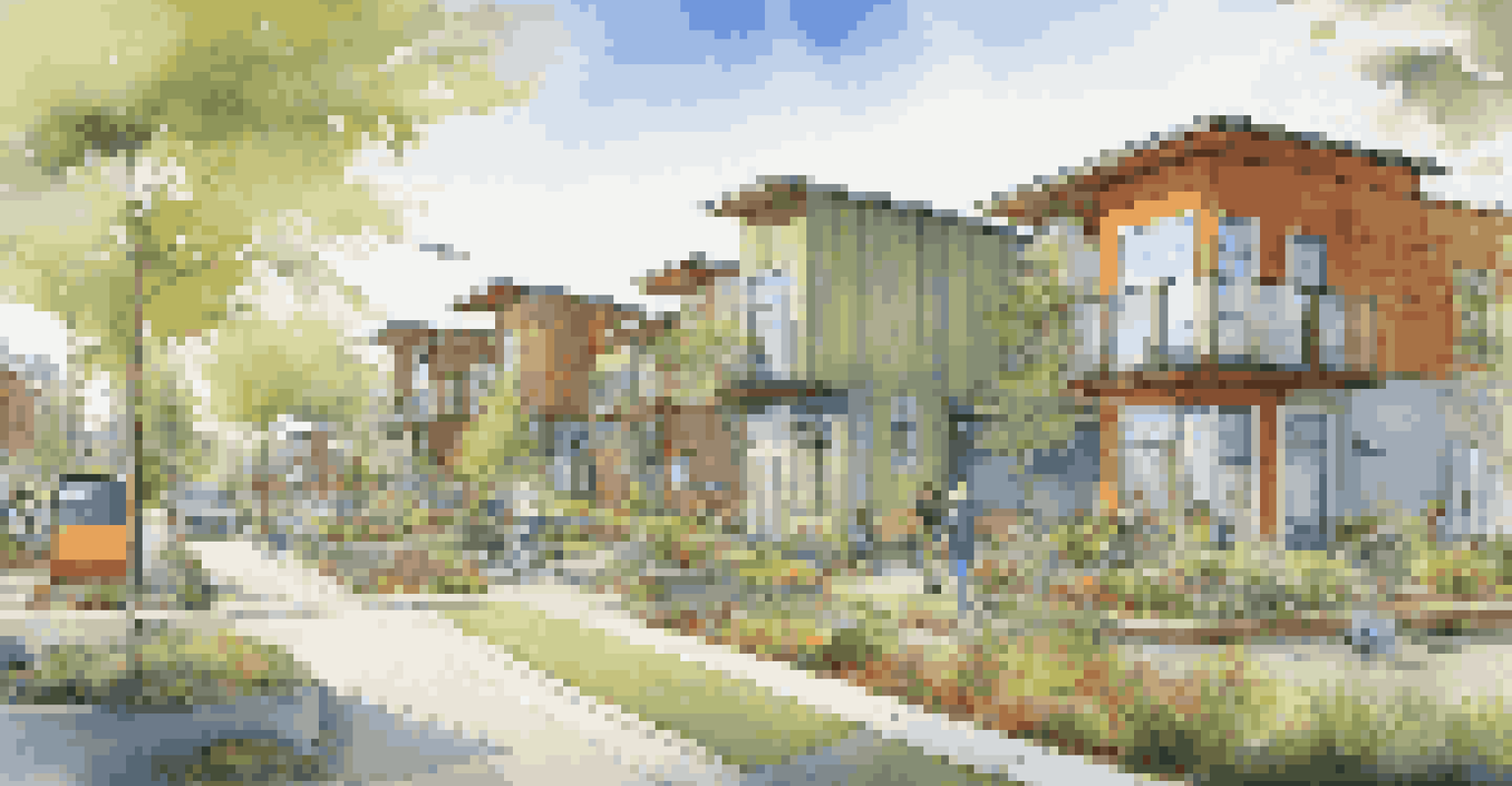The Importance of Sustainable Certifications for Home Buyers

Understanding Sustainable Certifications in Real Estate
Sustainable certifications are official recognitions that a home meets certain environmental standards. These certifications often focus on energy efficiency, water conservation, and sustainable materials. For home buyers, understanding these certifications can provide clarity about the home's impact on the environment and its overall value.
The greatest threat to our planet is the belief that someone else will save it.
Popular certifications include LEED (Leadership in Energy and Environmental Design) and ENERGY STAR, which signify that a home has been built or renovated with sustainable practices in mind. This can mean lower energy bills and a healthier living environment. As a buyer, knowing what these certifications mean can empower you to make a more informed purchase.
In a world increasingly focused on sustainability, these certifications aren’t just buzzwords; they represent a commitment to responsible living. When buyers recognize the importance of these labels, they can advocate for greener practices in the housing market.
Benefits of Sustainable Homes for Buyers
Choosing a home with sustainable certifications can lead to significant financial savings. Energy-efficient homes often have lower utility bills, which can add up to substantial savings over time. Moreover, these homes generally require less maintenance, further reducing long-term costs.

Beyond financial benefits, sustainable homes often provide a healthier indoor environment. Homes that meet green standards are typically built with non-toxic materials and better ventilation systems. This means cleaner air and a more comfortable living space for you and your family.
Sustainable Certifications Matter
Understanding sustainable certifications like LEED and ENERGY STAR helps buyers make informed decisions about a home's environmental impact and value.
Additionally, many buyers today are looking for properties that align with their values. A sustainable home can enhance your lifestyle and give you peace of mind, knowing that you are contributing to the health of the planet. This alignment can lead to increased satisfaction in your living situation.
Impact on Property Value and Resale Potential
Investing in a home with sustainable certifications can enhance its resale value. As more buyers prioritize sustainability, homes with these certifications are often in higher demand. This trend can lead to a stronger investment return over time.
Sustainability is no longer about doing less harm. It's about doing more good.
Research indicates that homes with energy-efficient features sell for more than their standard counterparts. This means that not only are you making a responsible choice for the environment, but you are also making a savvy financial decision. Sustainable homes can appeal to a broader range of potential buyers in the future.
Moreover, as regulations around sustainability continue to evolve, homes that meet these standards will likely remain compliant and desirable. This future-proofing aspect adds an extra layer of reassurance for buyers concerned about potential market changes.
Navigating the Certification Process
While understanding certifications is crucial, navigating the certification process can be complex. Many buyers may feel overwhelmed by the technicalities involved. However, engaging with a knowledgeable real estate agent can simplify this journey significantly.
A good agent can help identify homes with the desired certifications and explain the benefits associated with them. They can also guide you through the steps needed to verify a home's sustainability claims, ensuring you make a well-informed decision.
Financial and Health Benefits
Choosing sustainable homes can lead to lower utility bills and a healthier living environment, making them a smart choice for buyers.
Additionally, many local governments and organizations offer resources to assist buyers in understanding sustainable certifications. Tapping into these resources can further ease the process and enhance your confidence in your home-buying choices.
The Role of Government and Local Programs
Government initiatives play a significant role in promoting sustainable housing. Many local governments offer incentives for home buyers who choose certified sustainable homes, such as tax credits or rebates. These programs can make green homes more accessible to a wider audience.
In addition to financial incentives, local programs often provide resources and information about sustainable building practices. Buyers can take advantage of workshops or consultations that explain the benefits of these homes and how to find them in the market.
By participating in these programs, buyers can become advocates for sustainability in their communities, encouraging further development of green housing options. This collective effort can lead to a more sustainable future for everyone involved.
Challenges in Finding Sustainable Homes
Despite the growing awareness of sustainable living, finding homes that meet these certifications can still pose challenges. Many markets have limited options, especially in areas where sustainable building practices are not yet the norm. This scarcity can make it difficult for buyers to find their ideal home.
Additionally, the perception that sustainable homes are more expensive can deter some buyers. While it's true that some green homes come with a higher upfront cost, the long-term savings often outweigh this initial investment. Educating buyers about these aspects is crucial for changing perceptions.
Rising Demand for Green Homes
As sustainability becomes a priority, homes with certifications are likely to appreciate in value and appeal to a broader market.
However, as the demand for sustainable housing continues to rise, the market is likely to adapt. With increased awareness and efforts from builders and developers, more certified homes will become available, offering buyers greater choices in the future.
The Future of Sustainable Housing
The future of housing is undeniably leaning towards sustainability. With growing environmental concerns and climate change, more builders are adopting green practices. This shift not only benefits the planet but also caters to the preferences of modern buyers who prioritize sustainability.
As technology continues to advance, new sustainable building materials and methods are being developed. Innovations like solar panels, smart home technology, and energy-efficient appliances are becoming standard features in new homes. This evolution means that buyers can expect even greater benefits from sustainable homes in the future.

Moreover, as communities focus on sustainability, neighborhoods with certified homes may cultivate a culture of environmental responsibility. This community aspect can enhance the living experience, making sustainable homes not just a choice, but a lifestyle.